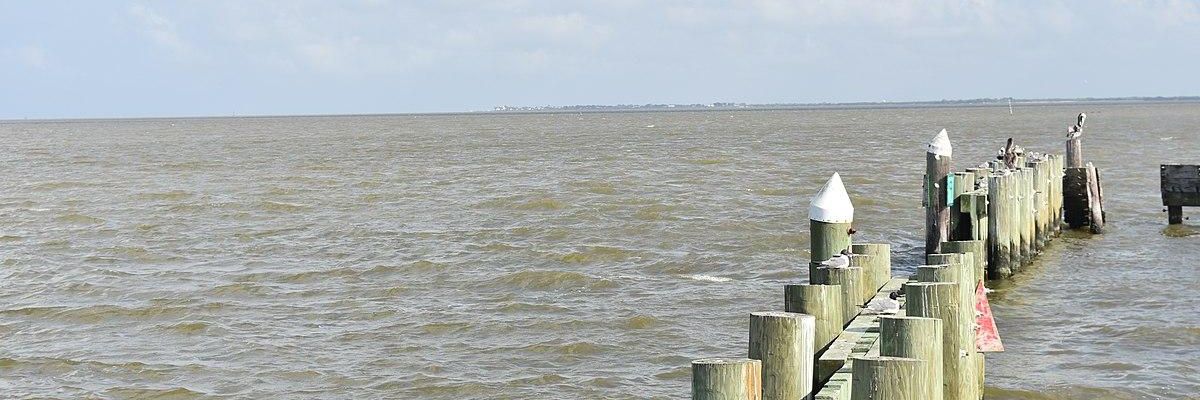The many sparkling bays along the Texas coastline of the Gulf of Mexico have long provided both a working-class living and a valued lifestyle for generations of shrimpers, oysterers and other fishing families. People and seafood, however, are not the only creatures here, for such wildlife as alligators and snakes also call many of these interconnected waterways home. Yet, by necessity and experience, the hardy people of the water have figured out how to share the bays so all creatures can get along.
But in the 1980s, a strange and invasive new critter entered Lavaca Bay, near the town of Port Comfort. Far from getting along, this species proceeded over the years to devour whole harvests of seafood, along with the livelihoods of local Gulf communities. This marauder was not some monster from the deep but a massive, 45,000-acre factory looming over Lavaca Bay. It is the Formosa Plastics Corporation, founded by the richest man in Taiwan.
As its name implies, Formosa is not here for seafood. It is the world's second largest fabricator of polyvinyl chloride, the tiny, highly toxic pebbles and powders used to make the gabillions of plastic bags, pipes, bottles, etc. that are choking the Earth. For decades, the Formosa plant has cavalierly been dumping trillions of these poisonous pebbles and tons of the polyvinyl powders into its wastewater--which end up in Lavaca Bay.
That poisonous content then spreads to other bays, nearby waterways, the Gulf itself ... and into the shrimp, oysters, fish and other creatures living there. The result has been species vanishing from these waters, creating economic and social devastation for families and port communities that rely on nature's bounty.
Wait, isn't this against the law? Of course, but petrochemical behemoths like Formosa have corrupted the law, turning Texas lawmakers and environmental regulators into their puppets. When leaders won't lead, The People must, and that's exactly what's happening in this case. A defiant, determined former fourth-generation shrimper named Diane Wilson, along with a scrappy environmental coalition on the Texas Gulf Coast, have just won the largest citizen environmental lawsuit in U.S. history, forcing Formosa to stop its gross contamination of the bay, the local economy and the law.
It's good to have a happy-ending story for the holidays--one that's not sugar-plum sappy but genuinely uplifting.
It "feels like justice," said Wilson in early December when a federal district judge OK'd a $50 million pollution settlement against Formosa Plastics Corporation. Judge Kenneth Hoyt, a Ronald Reagan appointee, had previously ruled that the Taiwan plastics conglomerate was a "serial offender" whose violations of America's Clean Water Act were "extensive, historical, and repetitive." How the case got there is as important as his ruling.
Wilson, the indefatigable local shrimper, had been trying for some 30 years to get state and national officials to stop Formosa from dumping poisonous plastic chemicals into the Lavaca Bay ecosystem. The corporation's deliberate contamination was destroying seasonal seafood harvests upon which she and thousands of Gulf Coast fishing families relied. She was ignored by those in power and then ridiculed and then demonized. Yet this lady of the sea wouldn't quit. She kept speaking out, mounted hunger strikes and even tried to sink her own beloved shrimp boat in the bay as a public protest.
Nothing. But then, backed by a volunteer network of regional environmentalists and a savvy group of nonprofit legal service lawyers, Wilson filed the private citizens lawsuit in July 2017 that came to trial this spring in Judge Hoyt's courtroom, finally producing an overdue measure of justice. The $50 million settlement doesn't go to Wilson or the other plaintiffs but to projects that will revitalize local marine ecosystems and create a shrimping and oyster cooperative for local families. It also will pay for citizen-group monitoring of Formosa's compliance with the judge's orders for "zero discharge" of its plastic pollutants.
Even more significant than the money that the Formosa settlement provides, this victory sets a major legal precedent to advance other citizen lawsuits against polluters, requiring that the polluters (not taxpayers) pay for their messes. Who needs Santa Clause when "We the People" can deliver such democratic gifts to ourselves? For information on the details and impact of this remarkable people's victory, go to the Texas RioGrande Legal Aid website.




